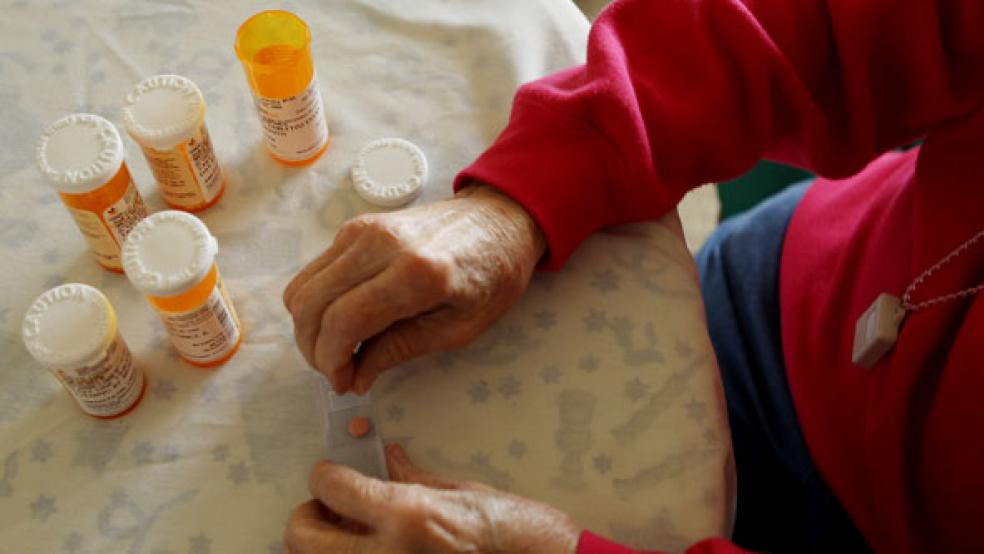The 80-year-old man, a veteran of the Korean War who raised 6 children, won’t take his medication. He’s forgotten why he should.
A liver transplant patient from over a decade ago, the man knows the pill ritual. He has the drill down. A little applesauce in a spoon, a quick swallow – done.
Every day for life. But not today. Today is not a good day so far. “I don’t think it’s doing me any good,” he tells my mom.
The man is my father. Mom has called me for support. “He won’t budge today. I’m out of ideas. Maybe you can help.”
“Let me try,” I say.
Questions
As hard as the physical breakdown has been, Dad's mental losses have been even tougher. Not long ago he started asking unusual questions. He’d wake up in the morning, glance around the quiet house – and ask, “Where are the kids?" After a long pause, he'd sigh and say, "I guess they’re at school by now.”
Related: Alzheimer's Will be Fiscal Nightmare of the Century
The nurses advised Mom to go along. It was easier that way, at least on the surface. “Yes, they’re all out of the house by now,” she’d say carefully. Her grown children, of course, had their own homes, lives and families.
My dad is one of the millions of people who will cost the nation an estimated $203 billion. He’s one in three seniors who will almost certainly die of Alzheimer’s or some other dementia, according to the Alzheimer’s Association. It wasn’t supposed to be this way. Alzheimer's was never an invited guest. But here we are with it in our midst, day and night.
Sometimes he wakes up at 2 a.m. “Where’s my car?” he says into the dark. “I haven’t seen my car in a while.”
“Why do you need it?” says Mom from the bed beside his. She long ago sold that car.
“I have sales calls to make. People are expecting me.”
“Today is Saturday,” she says patiently. “You don’t have work today. You can stay home with me.”
There’s a pause. “It’s Saturday? Are you sure?"
Dad hasn’t read a calendar, turned a page, dialed a phone, in months. He can't. He can’t walk, never mind drive.
For decades Dad drove the eastern corridor as a successful sales executive. He rose through the ranks of a Fortune 500 company and ran big regions of territory, with teams of bright young salespeople reporting to him. He gave pats on the back, helped seal a lot of deals, brought in money for the company and was duly rewarded. His success helped put his children through college and gave him ample time to enjoy his 18 grandkids.
Related: Alzheimer's Funding Should Be a No-Brainer
He can still, even now, be a great closer. You don’t need a car to close a deal.
On the phone, I hear Mom try to push the pills at him again. “No,” he says.
So now it’s my turn.
Negotiations
“Dad, I know you can do this,” I say.
“I don’t know why Mom wants me to take them,” he says.
As we talk, I pace in the little hallway of my home, trying to dredge up anything that might work. “They're helping you, Dad. They really are. Besides, the doctor wants you to take this medicine.”
Bringing up Doc usually moves the needle. Not today.
“Remember how you used to tell me to drink my milk?” I say finally. “Remember how, when I was little, you'd say, ‘Drink your milk so you'll be strong and healthy’?”
I hear his breathing on the line. “Yes,” he says at last.
We have a yes. “OK. So your medicine is keeping you strong and healthy, just like that milk did for me. This is keeping you alive. Keeping you going. You have to take it. I know you can, Dad."
When he protests again, I try a new tack: “Dad, I'll stay on the phone with you while you take it. I'm not leaving. I’ll hang with you. OK? Then we can talk again when you’re done.”
There's a big block of silence – then small noises, fumbling and fiddling. When Mom comes on the phone again, I tell her the plan.
“Let's try it,” she says.
For what feels like an eternity I cling to the phone, trying to hear every movement on their end while Mom gets the medicine ready. Is this how my father used to wait for me when I was being stubborn about something? I think. He was always so patient. I'm not giving up.
I hear their voices in the background. “OK, here we go, dear,” she says to him.
They’re in the kitchen together. I can picture it. Dad, his eyes watery and hands wrinkled, is sitting in the wheelchair, rolled up to his spot at the table. Mom is hovering nearby. She just wants him to be well.
I hear more sounds. Eating sounds. Then more silence, muffled movement, the minutes ticking by. Finally, Dad comes back on the line.
“Wendy?” he says. “Are you still there?”
He remembered. This time he remembered. “Yes, I’m here," I say.
Pause. Then – “The deal is done,” he says.
Rack up one more success for the deal closer.
I'm relieved, grateful, pleased at his accomplishment. “You did it, Dad. You closed the deal. I knew you could. I’m so proud of you!”
Then I hear the familiar voice and the words I used to hear as a kid: “Wendy, I’m proud of you.”
The author, who requested anonymity, has written this article under a pseudonym.




